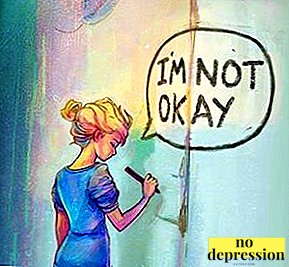 Depression in adolescents: causes
Depression in adolescents: causes
Does children have depression? Yes, sometimes. In some cases, some manifestations of depression begin at the age of five! Further, over time, children grow up and enter into adolescence, rich and chaotic. Pubert can be called one of the most difficult periods in life! How parents will be greatly dependent on their parents. Editorial help to understand.
Pubert is one of the most difficult periods in life!
Teens experience frequent mood swings. Still, incomprehensible formations appear on the body, the voice sounds strange and in general in the class everyone looks at you. And then there are problems with school or first love! In short, everywhere. This can confuse restless parents, as it is not easy to distinguish the usual bad mood of your child from depression, which does not bode well.
Complicating the situation is that adolescents themselves are often not able to clearly define what is happening to them. In our society, from generation to generation, it is accepted to deny and not accept our feelings, in extreme cases - to blame ourselves for them. Culture of awareness and acceptance of their feelings is not and was not. This leads to a reluctance to talk about their experiences and removal from others.
Advice to parents: you should start with yourself
The child does not talk about their feelings, but for you it is important? Tell him about yours. Only without harassment and manipulation. It is better to start with “I-messages” (that is, to talk ONLY about yourself and your feelings):
"I feel anxiety for you"
“I would really like to help you deal with this situation.”
The child still does not make contact? It does not matter, you can always tell him that when he is ready, you are happy to hear and try to help. And here the most - the most important moment - not to explode from the child’s refusal to talk to you, not to reproach him with his beloved parental key, "we are everything to you, but you!", But very calmly wait. Continue to love, care and smile, even if your child has become unbearable and prickly. This is temporary!
As a rule, stressful phenomena become the causes of depression in adolescents:
- completion of schooling
- fear of future attempts to enter a higher education institution
- social stress
- first love experiments
- changes in hormonal levels in the body
- finding your place in life
- desire to be independent
- and many, many (many!) others
The probability of the onset of depression at this age is extremely high, and therefore parents should talk with their children, try to understand and help. But it is not always possible to find a common language with a teenager who is confused in himself and very keenly perceives any awkwardly spoken word. A family psychologist is sure to help here. Our site shares the general recommendations that you somehow will hear from family psychologists.
Do not blame, but trust
During a conversation with a teenager, one cannot resort to accusations, emphasizing the guilt of being depressed (frankly, it is better to look for the guilty in this room again if you really want :)). Also, many parents give their voice intimidating tone, only worsening the emotional state of the child. In this case, the adolescent will most likely come to the conclusion that his parents do not believe him and do not accept his frankness (and it is very scary to remain without support!) And tend to believe that his depressed state is a common fiction to attract attention. Even if this is the case, think about why the child needs your attention?
Parents need to show a teenager that they trust him completely. In conversation, one should support the child and be encouraged by the phrases that the child is acting correctly in this situation, that he will be able to cope with all the problems. Such an approach will instill confidence in the child, allow him to open up and engage in conversation with his parents. Show your child an example, frankly tell him about your feelings in this situation.
Do not underestimate, but take the problem seriously
Depression is a mental illness that requires serious treatment. If parents allow themselves to carelessly treat an existing problem, then they risk the mental stability of their child. Also, it is equally impossible to directly tell a teenager that his depression is far-fetched, and a bad mood will self-correct with time. The child will defend himself, proving his rightness, and after that he will completely withdraw into himself, not wanting to continue the conversation.
During the conversation, parents should use real cases from the life, similar to the situation of their child. They have to prove to a teenager that the problem of depression at this age is very important, show your concern (only without manipulations please) with the problem, the probability that the child will be frank with you in this case, higher.
Not one, but a lot of talk
After parents managed to talk with their child about depression, they might get the feeling that the problem was solved and one conversation was enough. But in no case should we stop at just one conversation. Of course, it is embarrassing to raise a similar topic for both the child and his parents, but such constant conversations are necessary so that the adolescent can survive this period without harm to his mental and even physical health.
Parents need to exercisesincere interest to the child, to his feelings, and not to marks in school
Without a doubt, it is extremely difficult to find an approach to a teenager who is in a depressed state, but parents have no other choice if they want their child to cope with their problems and overcome all the difficulties that they will have in their way. Once again, we note here the main recommendation. Our site: going to a psychologist never hurts.
The main thing: love does not happen much
Depression in adolescents often begins due to family problems. Do you give your child enough freedom? Respect his choice? Do you consider his opinion? Remember, it is impossible to love the child. Just in case: to buy, what he wants on demand or to blow specks of dust from him is not love, but maintenance of one’s own fears. Love is your time, with sincere interest and pleasure spent with the child. Is it hard? Everything will work out!

 Depression in adolescents: causes
Depression in adolescents: causes

